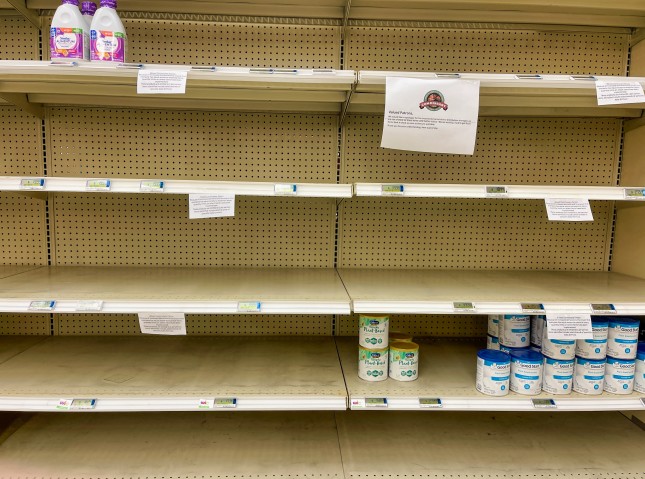-
Covid-19 // Dot-Mom // On the Beat
Community and Collaboration: Maternal Mental Health in the Infant Formula Crisis
June 22, 2022 By Alyssa Kumler
The infant formula shortage and the COVID-19 pandemic have added fuel to an already existing fire in maternal mental health in the United States.
As Adrienne Griffen, Executive Director of Maternal Mental Health Leadership Alliance pointed out at a recent event on the COVID-19 pandemic, maternal mental health, and policy solutions, “maternal mental health conditions, including anxiety, depression, and other issues, affect 1 in 5 pregnant or postpartum people [in the U.S.].”
And a “simply unacceptable” lack of treatment for those in crisis only fans the flames, observed U.S. Representative Katherine Clark. She said that more than 75 percent of those experiencing maternal mental health issues never get treatment.
Even in moments where there are not immense external stressors on mothers and children, added Griffen, “untreated maternal mental health conditions can have a negative, long-term impact on mother, baby, family and society.” But the extended pandemic and the recent shortage of essential infant formula are exacerbating the crisis.
“Suffering is extremely profound in some cities, and most notably in Houston and Phoenix,” said Joy Burkhard, the Founder and Executive Director of 20/20 Mom. “Mothers there have been suffering severely, both by the formula shortage, and having the highest rates of maternal depression in the country”
Community support is essential to address the increased strains on maternal mental health. “We are the solution” said Kay Matthews, Founder and Executive Director of Shades of Blue, a Houston community-based organization supporting women of color throughout pregnancy, and the perinatal period. “The community is a missing link within a lot of conversations.”
In Texas, the community support offered by Shades of Blue provides mental health services, necessities, and job support. Matthews observed that when mothers struggle to secure necessities, like food for their infants, it is difficult to support their mental health. “We address their needs and what they want first,” she said, “and clearly it is about getting them the basic necessities. So, we lead with that and then we follow up.”
Securing necessities is complicated by the infant formula shortage. Mariel Mendez, a mother from Washington state, described the challenge of finding specific formula for her dietary restricted child. Some parents must make the difficult decision of giving their children whatever they can find, even if that means that there could be further medical or health issues.
“That’s an awful place to be as parents,” said Mendez.
Burkhard noted that particular aspects of the health care system also challenge much needed support for maternal mental health. For instance, mental health complications are the most common complication of childbirth, Yet mental health screening is not a universal element of maternal care, and is left up to individual states and providers, leading to fragmentary access for mothers.
A shortage of providers also heightens the crisis. Dr. Mary Kimmel, Medical Director of NC Maternal Mental Health Matters (NC Matters), observed that the majority of counties in North Carolina are considered to not have adequate mental health providers. Kimmel’s organization is a federally funded program that provides collaborative care by educating and connecting maternal health care providers to psychiatrists for consultation.
Legislators are proposing solutions to help put out the flames. Along with Representative Jaime Herrera Butler, Rep. Clark is co-sponsoring Into the Light— a bill that supports maternal mental health services by expanding funding for programs such as NC Matters. Speakers also pointed to legislation proposed by Representative Larry Bucshon, M.D., who is co-sponsoring the TRIUMPH for New Moms Act, which would create a federal task force to investigate maternal mental health and provide policy recommendations for states.
As the new challenges of COVID-19 and infant formula scarcity worsen an already existing crisis in maternal mental health, expanding community efforts to support mothers and adopting policy solutions to create collaborative care systems are increasingly important tools to improve the lives of mothers and children.
“When moms are not taken care of, our children are not cared for,” said Mendez. “If we care about our babies, me must care for our mothers and caregivers.”
Read more:
- Respectful maternity care is critical to address maternal mental health
- COVID-19 has exacerbated gender based violence and survivors have unique maternal health needs
- Federal initiatives to reduce structural inequities in maternal health
Sources: 20/20 Mom, American Hospital Association, Datasembly, Journal of Maternal-Fetal & Neonatal Medicine, Centers for Disease Control and Prevention, Maternal Mental Health Leadership Alliance, NC Maternal Mental Health Matters, Shades of Blue.
Photo Credit: View of empty Baby formula shelves at the grocery store. Rosamar/Shutterstock.com
 A Publication of the Stimson Center.
A Publication of the Stimson Center.



